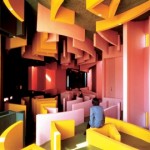 Ah, death. The Grim Reaper. Ashes to ashes, dust to dust.
Ah, death. The Grim Reaper. Ashes to ashes, dust to dust.
It comes to us all eventually, no matter how eloquently we “Rage…against the dying of the light.”
Arakawa, a Japanese-born conceptual artist, passed away at the age of 73 on May 18, 2010. He died at a relatively young age for a Japanese male, who enjoy a life expectancy at birth of 78.5 years, the fourth-longest in the world after Hong Kong, Iceland, and Switzerland. Even in America, a country not known for its healthy habits, a male having successfully survived to age 73 has an average life expectancy of 11 more years, to the ripe old age of 84.
What makes Arakawa’s demise uniquely interesting is that he used his art to explore “ideas about mortality by creating buildings meant to stop aging and preclude death…(his) most recent work, a house on Long Island, had a steeply sloped floor that threatened to send visitors hurtling into its kitchen…. it featured more than three dozen paint colors; level changes meant to induce the sensation of being in two places at once; windows that seemed too high or too low; oddly angled light switches and outlets… to lead its users into a perpetually ‘tentative’ relationship with their surroundings, and thereby keep them young.” (The New York Times, May 20, 2010)
Arakawa’s work was called “a comic stroke with cosmic intention” and “puzzles (that) can stretch the mind in briefly pleasant ways.” Or in more pedestrian terms: “It has to do with the idea that you’re only as old as you think you are.” (Ibid.)
I am familiar with Arakawa’s work and his anti-aging, pro-living philosophy that he called reversible destiny (www.reversibledestiny.org). His death was unexpected, thus a bit of a surprise.
If there is a lesson, an admonition in Arakawa’s relatively early departure from mortal form, it is simple: smell the roses, enjoy the moment, live each day fully.
No cosmic secret, just a quiet reminder about the truly important things in life.
My closing quote is Dylan Thomas’s famous poem (which I take not so much as to fight the inevitability of death but to live fully to the last possible moment: “Old age should burn and rave at close of day”):
Do Not Go Gentle
Do not go gentle into that good night,
Old age should burn and rave at close of day;
Rage, rage against the dying of the light.
Though wise men at their end know dark is right,
Because their words had forked no lightning they
Do not go gentle into that good night.
Good men, the last wave by, crying how bright
Their frail deeds might have danced in a green bay,
Rage, rage against the dying of the light.
Wild men who caught and sang the sun in flight,
And learn, too late, they grieved it on its way,
Do not go gentle into that good night.
Grave men, near death, who see with blinding sight
Blind eyes could blaze like meteors and be gay,
Rage, rage against the dying of the light.
And you, my father, there on the sad height,
Curse, bless, me now with your fierce tears, I pray.
Do not go gentle into that good night.
Rage, rage against the dying of the light.

